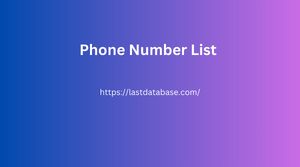Post by account_disabled on Feb 20, 2024 6:17:39 GMT -5
The of pathology images improving treatment planning. Drug Response Prediction Predictive modeling assists in determining the most effective cancer treatments based on individual patient characteristics. IV. Drug Repurposing and Polypharmacy Optimization a. Identifying Drug Repurposing Opportunities Data Mining and Integration AI analyzes vast datasets to identify existing drugs with potential applications in different therapeutic areas. Accelerating TimetoMarket Drug repurposing guided by AI shortens the time needed to bring existing drugs to new indications. b. Optimizing Polypharmacy Drug Interaction Prediction AI models between multiple medications minimizing risks associated with polypharmacy. Personalized Medication Plans Tailored medication plans informed by AI enhance treatment efficacy while minimizing adverse effects. V. AI in Biomarker Discovery and Diagnostics.
Biomarker Identification Omics Data Analysis AI analyzes omics data to identify potential biomarkers for disease diagnosis and prognosis. Early Detection Early identification of biomarkers enables proactive disease diagnosis and intervention. b. Diagnostics and Imaging Analysis Medical Imaging Interpretation AI enhances the accuracy of medical imaging analysis aiding in the early detection of diseases. PointofCare Phone Number ListDiagnostics AIdriven diagnostic tools provide rapid and accurate results at the point of care. VI. Ethical Considerations and Challenges a. Data Privacy and Security Sensitive Health Data The integration of AI and biotech raises concerns about the privacy and security of sensitive.

Health information. Ethical Use of AI Establishing guidelines for the ethical use of AI in biotech ensures responsible and transparent practices. b. Bias and Fairness in AI Algorithms Representation in Datasets Biases in datasets used to train AI models may lead to disparities in healthcare outcomes. Algorithmic Transparency Ensuring transparency in AI algorithms helps address bias and enhances fairness. VII. Future Directions and Collaborations a. AIDriven Collaborations Industry Partnerships Collaborations between AI and biotech companies foster innovation and the development of advanced solutions. CrossDisciplinary Research Integrating expertise from AI biotech and healthcare disciplines drives comprehensive advancements. b. Regulatory Frameworks and Standards Guidelines for AI in Healthcare Regulatory bodies play a crucial role in establishing guidelines and standards for the ethical use of AI in biotech and healthcare. International Collaboration Global cooperation ensures consistency in regulatory frameworks and encourages.
Biomarker Identification Omics Data Analysis AI analyzes omics data to identify potential biomarkers for disease diagnosis and prognosis. Early Detection Early identification of biomarkers enables proactive disease diagnosis and intervention. b. Diagnostics and Imaging Analysis Medical Imaging Interpretation AI enhances the accuracy of medical imaging analysis aiding in the early detection of diseases. PointofCare Phone Number ListDiagnostics AIdriven diagnostic tools provide rapid and accurate results at the point of care. VI. Ethical Considerations and Challenges a. Data Privacy and Security Sensitive Health Data The integration of AI and biotech raises concerns about the privacy and security of sensitive.

Health information. Ethical Use of AI Establishing guidelines for the ethical use of AI in biotech ensures responsible and transparent practices. b. Bias and Fairness in AI Algorithms Representation in Datasets Biases in datasets used to train AI models may lead to disparities in healthcare outcomes. Algorithmic Transparency Ensuring transparency in AI algorithms helps address bias and enhances fairness. VII. Future Directions and Collaborations a. AIDriven Collaborations Industry Partnerships Collaborations between AI and biotech companies foster innovation and the development of advanced solutions. CrossDisciplinary Research Integrating expertise from AI biotech and healthcare disciplines drives comprehensive advancements. b. Regulatory Frameworks and Standards Guidelines for AI in Healthcare Regulatory bodies play a crucial role in establishing guidelines and standards for the ethical use of AI in biotech and healthcare. International Collaboration Global cooperation ensures consistency in regulatory frameworks and encourages.
